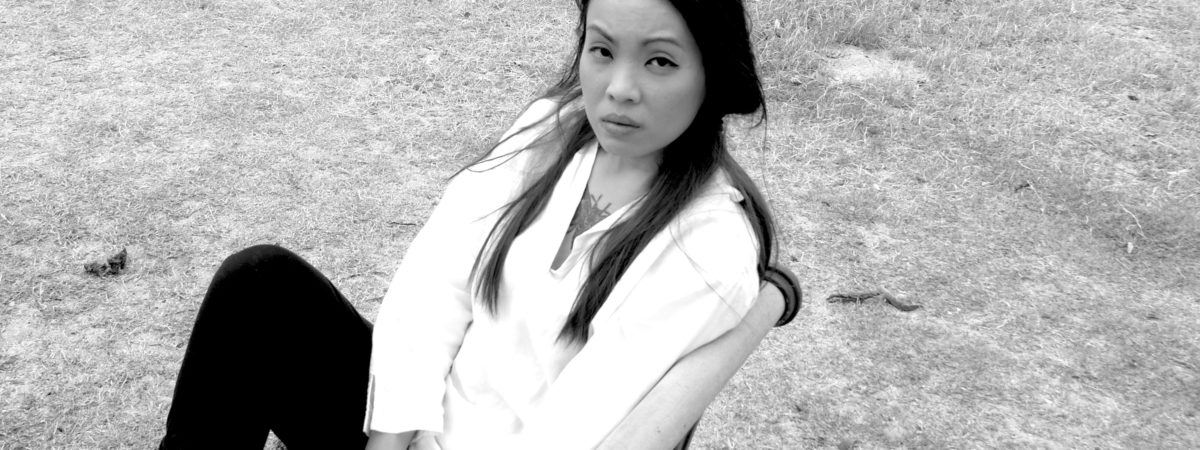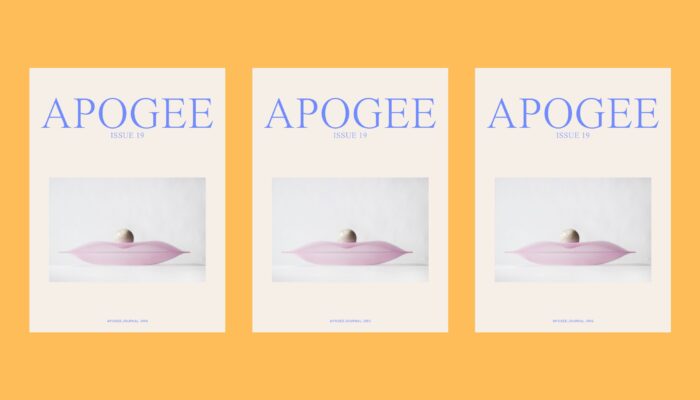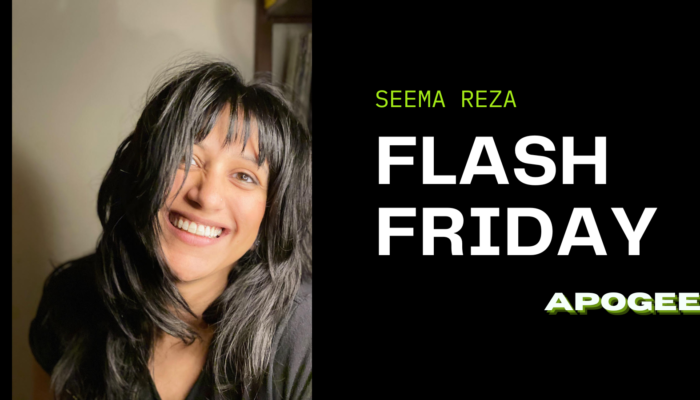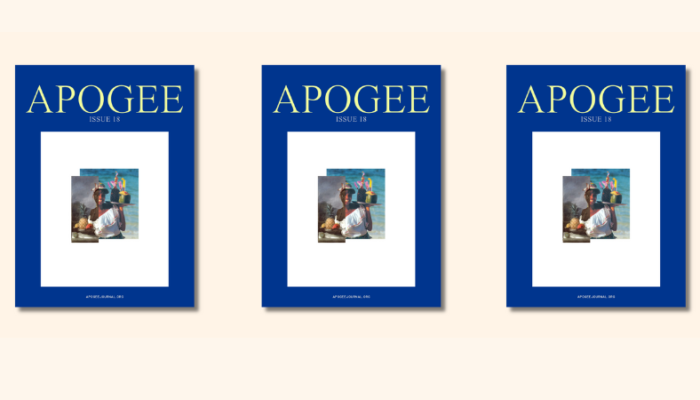Wawa (also published as Lo Mei Wa) is a Hong Kong poet now based in the U.S. Her poem, “維多利亞港天台建國/Rooftop Nation of Victoria Harbour,” which appears in Apogee Journal’s Issue 09, comes at a profound time of global protest and resistance. In this interview, she shares her thoughts on the imagined reality of the poem, Hong Kong’s Umbrella Movement, and the usefulness of language and feeling.
—Muriel Leung, Poetry Co-Editor
Muriel Leung: Your poem, “維多利亞港天台建國/Rooftop Nation of Victoria Harbour,” which appears in Chinese and English in Apogee Journal Issue 09, was originally sent for consideration for our #NoDAPL folio curated by Sarah Clark, Joey De Jesus, and Victoria Cho. What correlations did you see between the circumstances described in the poem and indigenous resistance at Standing Rock?
Wawa: In 2014, the Umbrella Movement broke out in Hong Kong. People occupied the streets after tear gas was launched on September 28th. I ran to the front lines and stayed in the occupied zones until the government cracked down on everything in December. For our generation, which was the last generation of British colonial Hong Kong, it was our first time to initiate a protest on such a scale that clearly asserted our identities as Hongkongers, to fight for authentic democracy. Hong Kong has been colonized a second time by Communist China, and in our fifty-year period of transition we are fighting to defend our autonomy and values. That first night, I had arrived with fruits, eggs, juice-boxes of soymilk in my backpack, which I threw at the riot police as my sister ran at them, and they launched the second round of tear gas. That was probably (and secretly) the last instance of violence from protesters throughout the entire Occupy period. The movement was peaceful. No looting. No one beat up a police officer. Tents were set up. We slept in the streets. Study corners, where I wrote most of my poems, were set up for students. Volunteers emerged to help with students’ homework, to give public lectures, and to haul trash. The gallery I worked for closed for a few days so we could go out to the streets. I lost twenty pounds over that period from a severe deficit of sleep, and developed asthma from the tear gas—six inhalers were handed to me when I was about to collapse. Our only “violence” was to stay, to not leave. We shielded ourselves from pepper spray, batons, and other formulas of tear gas with face masks, umbrellas, and kickboards. There was only one reason why we were there—we wanted authentic democracy to be the foundation of our future, in order to make sure nothing else would be taken away from us. The failure of this protest is a very deep collective trauma, and tears still run down my face as I write all this.
I moved to America one year later, married to an Asian-American who fought in the same protest in Hong Kong by himself. American history was not included in my education in Hong Kong, so I educated myself in the history of this country, which to me means Native American history from long before the pilgrims of Plymouth. One day during the Umbrella protests, I stood up in the street and told people that I was here to fight for our future generations. My dad is a hardcore Chinese Communist supporter who was hired to beat up protestors like me and my sister. I don’t want our future generations to be unable to tell right from wrong. Just this simple. I could fight a lot more tear gas for just this. It’s just like NoDAPL protestors who fought for clean water, for the right to not have even more taken away from them. Our movement in Hong Kong failed. “Rooftop Nation of Victoria Harbour” was my stupid imagination of a solution to the failure of our future. The poem is very contextual to Hong Kong, which is a few times denser than NYC. The street was one world that we failed to overthrow. But people who fall out of place can escape vertically to unused rooftops. Let’s fucking build a goddamn nation there then, I naively imagined.
ML: For perhaps those reasons as well, we saw this poem fitting with our current issue on “Emergency.” As Legacy Russell, Apogee Journal’s Visual Art Editor, writes in the issue’s letter to the editor, “We are in a state of reiterative emergency.” In your words, how do you feel the poem responds to this theme and statement?
W: I’m not sure if “reiterative emergency” means re-articulating, or re-defining, or repeating emergency. But I’m not sure if Hong Kong today, be it “post-umbrella-movement” or “post-fishball-riot,” a riot that took place one year after Umbrella, is in an emergency in any sense. We do have an expiry date: in 2047 we’ll fully be returned to the People’s Republic of China. We are indeed counting down to the last day. But there’s a pervasive post-traumatic collective evasiveness, numbness, and silence going on now. Nobody knows if it’s the silent wait for 驚蟄 (the 3rd lunar solar term), like for a more radical resistance, or if that’s it, nothing more until 2047.
ML: I was struck by the refrain and list-like quality of the poem, of rooftop after rooftop, of buildings of varying staggering heights. It seems to establish the quotidian way of life in Hong Kong, where one can smoke and listen to someone talk of revolution, but this pattern, which seems benign at first, accrues in tension through repetition. In the midst of describing the everyday, Jane Lam jumps off one of the buildings and the speaker declares, “Hell, let’s build a goddamn nation on the rooftop.” The way this poem moves gradually and through refrain, the loud smack in its middle, and its continuity, seems very much like a social movement, how actions build and gain political significance through quotidian moments amassing into something greater.
Was this something you considered in the writing of this poem? How does this movement communicate in English and in Chinese, each on their own terms? What gets communicated in one language that is perhaps missing in another?
W: My publisher at Tinfish asked me what “vertical reality” in Hong Kong is, and I said to her, “I’ll write a poem to answer your question.” This is how this poem came about in the first place. My poems, including this one, synthesize everything that’s screaming in my mind and heart. I think, first, this poem isn’t meant to be purely political. It’s much more than that. The failures of the Umbrella Movement and the Fishball Riot are there. The disappointment with the city’s values is there. The loneliness and helplessness of existence, of failing to conform to the “horizontal reality” given by school, family, work, and the government, are there. The rooftops are a form of abandonment, synonymously meaning freedom. The people up there are abandoned. The streets are killing them. Some stay on the rooftop long enough to start living off their ideals, their beliefs and values. Some cannot find peace in this lonely “freedom,” and surrender by jumping off the building. Jumping off a building is the most common way to die, to quit, in Hong Kong. We don’t have other states. We can’t move except to China, a fact that many people are still adjusting to since the city used to operate like a country when it was a British colony. People in the streets get killed by people jumping off buildings. When I was a kid, I always imagined holding a steel umbrella that could shield me from people jumping off buildings. Then when I grew up, I became a rooftopper imagining what to do there, and whether to jump or not. Building a nation on rooftops is my image of utopia. The rooftop is freedom. I heard that when people are in a desperate hopelessness, imagination becomes salvation.
When the poem gets translated, the context shifts from the particular to the universal. A Hongkonger would immediately assume the difference between vertical and horizontal realities, which is particular to that level of density. But for another reader, linguistic markers like the number of stories up each rooftop are necessary, and can only suggest the setting. So the existential implications are weakened. Also, the swearwords are weakened a lot. Recently, I started to include Cantonese in my poems. There are different kinds of Chinese’s in the world. I want to start a small revolution to restore the dignity and integrity of my mother tongue, which might even be belittled by our own people. “Cantonese is vulgar. It doesn’t sound serious enough in poetry.” I want to crack down on these superstitions even among Hong Kong poets. Cantonese swearwords are the most glamorous part of our language. In one Cantonese swearword competition in 1969, the winner came up with a combination of 36-character swearwords without repetition. There are many combinations of swearwords to express different strengths of emotions like disgust, anger, etc.—a very precise dissection of the emotions. The tone and the swearwords in the Chinese are diluted in the English translation of the poem.
ML: As a writer and translator, there is often talk of translation as a matter of “precision.” I don’t mean that in terms of exact transference of meaning from text to text, but that a translator can revel in the possibilities that emerge in trying to “get close.” Since you generated bilingual versions of this poem, does this approach still apply? How would you describe your approach if it deviates from this?
W: I was trained as a singer all my life, from classical to pop to indie to rock. I always play two of my recorded songs for people, one sung in English, another in Cantonese, and always succeed in tricking them into thinking that they are sung by different singers. Coming from a bilingual ex-colony, I have an English me and a Cantonese me. I gave a workshop recently just talking about different voices in poetry through different languages as a singer. To “get close” in translation is kinda right, but it’s especially schizophrenic to me. I do terrible in self-translation from one language to another because my linguistic personality, which was already laid down in the poem, is too complete. I know the cultural context too well. I am totally there. I couldn’t translate “Nation Rooftop” and I did it terribly. I translated the poem into an English dictionary.
ML: How has your migration to the U.S. affected the way you view the parallel political circumstances of both the U.S. and Hong Kong? Your relationship to the political potency of writing in English and Chinese?
W: I have been trying very hard to understand the concept of America every day, and this sometimes results in migraines and insomnia. Migrating to this country, I suddenly was absorbed into a daily and endless struggle. I fell into conversation between the two sides of a dominating force and a resistant force. This conversation always sounds very everyday and natural to people here, but very unnatural to me. The struggle, of course, changes and grows over the course of history, but I am not sure if it’s going anywhere in this permanent self-feeding pattern. I’ve picked up a lot of new American vocabularies of color since I moved here. I keep receiving warnings and advice about what to do, even though I am always quiet and not planning to go out of my flat. My limbs always shake when I cross the border, where I always get stopped. There is always a black hole sucking at me from my feet up at customs. It’s not just about suddenly becoming a minority, while being a majority at home in Hong Kong. It’s suddenly having to think about surviving as a minority and feeling the terror of a brute-primordial fact that emerges as soon as I cross the border—my color, something that’s irreducible and can never change unless you tear off your skin. I was ostracized on so many levels and bullied all my life in Hong Kong. You can be a minority in many ways there, like being working class. But one can survive through and change it. The American structure of immigrant/color-hierarchy is one thing, then the struggle of asserting identities on top of being American is another, but then also the fact that the land, too, has her own indigenous people. My children will automatically be absorbed into and perpetuate this ocean of endless color-struggle, on top of Native history. I have loved the sacred landscape of America since I was a teenager: her oldest trees, her beautiful gemstones, her oldest rocks; but I don’t know what America I’m talking about now. It always drains all my brainpower to think about what America means and I still don’t know what it means and I’m so exhausted.
Last month, we brought my cat’s ashes back to Hong Kong to bury her on the small island where I lived. I am still in deep grief. We buried her in the late afternoon and when the sun fully set, a whole island of moths came out. Thousands and thousands of moths filled the air around us. It was at that moment I thought to myself, “The land is responding to me. This is my land.” To borrow from Louis Cha’s interview on his view on the Tiananman massacre, I am a person whose existence is so defined by and attached to “roots”, to “home.” I’m unlike other successful immigrants who can lead a life, better or worse, on a foreign land. I have to go home. My physical and mental health has shrunk to an alarming level here. So we are going back to Hong Kong, even if it just means being there to pray till we die. This whole time in the U.S. has been a life-changing vacuum for me, a chance to cleanse and purge all the toxins in my life in order to arrive at an existential clarity about myself and what I want to do in this world, this life. I was always writing in English when I was in Hong Kong. I started writing in Chinese, which became my first book, only after I migrated to America. Now I only want to write better in Chinese. It’s not about mastering a language; it’s articulating emotions through a language. For me, language is always a tool, a vehicle for translating feelings. And I’m open to more tools.
ML: What do you hope this poem can do? How do you hope this work can be resonant?
W: One day when I was still herding abandoned cows and water buffalos in Hong Kong, I suddenly realized that I, this one physical body, cannot save all these cows, nor can I save each and every miserable life in the world. I thought to myself, “I want something more efficient, metaphysical, transcendent, and timeless.” This is how I turned to writing, without knowing how to write a poem or what poetry was. I still go into my poetry without any training (but with my training in Philosophy and Music), but over time, I have also started growing my poetry. I hear my style, my voice. Every poem exhausts a few gallons of my tears, honestly. But, no. I don’t know what this poem or any of my poems can do and will do. I write to no audience. Every time before giving a reading, I state to my audience that I’m only reading as a human in this world, with no intention to educate, to seek sympathy, understanding, curiosity, or rescue from anything I say about Hong Kong. I’m really there just to read, and to get published is just to share.
ML: Is this poem part of a larger project? What projects can we anticipate from you in the near future?
W: No. But I will work on prayers next, and more prayers in the future.
Wawa (also published as Lo Mei Wa) is a Hong Kong poet. She received her degrees in Philosophy and has been a soprano, an indie singer, a lyricist, an art and design magazine editor, a philosophical counselling assistant, and a cowherd in Hong Kong. Some of her work can be found in Cha: An Asian Literary Journal, Guernica Daily, The M




